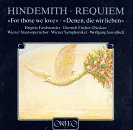| All Artists: Dietrich Fischer-Dieskau, Paul Hindemith, Wolfgang Sawallisch, Brigitte Fassbaender, Vienna Symphony Orchestra Title: Hindemith: Requiem "For Those We Love" Members Wishing: 0 Total Copies: 0 Label: Orfeo Release Date: 5/23/1995 Album Type: Import Genre: Classical Styles: Opera & Classical Vocal, Historical Periods, Modern, 20th, & 21st Century Number of Discs: 1 SwapaCD Credits: 1 UPC: 750582324826 |
Search - Dietrich Fischer-Dieskau, Paul Hindemith, Wolfgang Sawallisch :: Hindemith: Requiem "For Those We Love"
 | Dietrich Fischer-Dieskau, Paul Hindemith, Wolfgang Sawallisch Hindemith: Requiem "For Those We Love" Genre: Classical
|
Larger Image |
CD Details |
CD ReviewsDigital live recording in English of Hindemith's masterpiece Martin Selbrede | The Woodlands, Texas | 01/15/2006 (4 out of 5 stars) "This is a live recording, the first inklings of which come from audible coughs near the conclusion of the orchestral prelude. You can also hear the choir rising and re-seating itself (e.g., right before the song, "O How Shall I Warble Myself?")
What counters these circumstances so decisively are the two soloists, Dietrich Fischer-Dieskau and Brigitte Fassbaender. In my other reviews of this work, I've rarely done anything other than note the competence of the mezzo-soprano. But Fassbaender's work here cries out for recognition. The first two Ariosos never sounded better -- here, conductor Sawallisch properly adorns the vocal line, making a gorgeous vocal interpretation even better. Truly revelational, both in execution and emotional depth. Bravo, Brigitte Fassbaender! Of course, Fischer-Dieskau's voice is instantly recognizable. He brings an appropriate amount of drama to the work with his distinct declamations. Perhaps he doesn't necessarily deliver the deeper anguish that baritone WIlliam Stone achieved under Robert Shaw's baton, but I'm not sure that'd be possible given Fischer-Dieskau's approach. The two baritones' approaches are mutually exclusive -- you can bring out either one or the other aspect of the music, but not both. As for Sawallisch's interpretation, it got off to a rocky start in the Prelude, where the decision to shape the brass phrases as broad crescendo-decrescendo arches basically buried the end of the phrases in muffled sound against the pedal tone. It comes off poorly, as if the sound were being compressed by the engineer. This might possibly be the worst Prelude recorded, so far as the fortissimo climaxes are concerned (which are problematic to begin with given Hindemith's harmonically thick writing here). The conductor is on more solid ground elsewhere, and the Vienna forces never seem to fail to give him what he's looking for, while the energy of a live recording event is evident on the face of this rendition. Sawallisch takes the mezzo sequence in "Sing on, you gray-brown bird" faster than most, but it works beautifully because the phrases now seem to breathe correctly -- proving it's not a miscalculation. The duet toward the end is gorgeously sung, with tremendous impact. The choir has its moments. The feminine voices tend to come off sounding better than the male voices or the combined choral forces, with the exception of the a capella sections of the Death Carol, which come off nicely. This suggests that the actual underlying problem is one of recording balance. The trade-off is energy and intensity versus clarity and balance: you can achieve the latter attributes in a studio, but usually get a clinical, sterile performance in the process. In any event, the balance seems to improve over the duration of the work, and by the Death Carol we seem to have found a happy medium just before the glockenspiel entrance. From there on, the climaxes lack nothing either chorally or orchestrally. Sawallish then ups the drama quotient, giving us one of the most powerful readings of the the Death Carol recorded. Had this CD started out on such a footing, it might have earned all five stars. Not only do the balances improve during the course of the work, but Fischer-Dieskau, who starts off on an excellent footing, rises to magnificence by the penultimate movement ("To the tally of my soul"). It was a pleasure to hear someone invest Hindemith's words and music with such compelling expression, rather than merely "phoning it in." If you make this the first recording of the Hindemith work you'll own, it will doubtless prejudice you against the soloists in any other version. But if you later acquire the Shaw version on Telarc, you'll learn that much in the first half of the Requiem CAN be better rendered on all other fronts. But I'm having trouble thinking if any other version has achieved the heights this one has on the second half of the Requiem. I'm inclined to think that this version nails the second half in almost all respects. With gorgeous mezzo movements in the first half, and Fischer-Dieskau redeeming everything he touches with his golden throat, it's hard not to overlook the deficiencies in the early laps. Unfortunately, I have to review the entire Requiem, not its latter half (which is a 5-star powerhouse). Note that audience coughing seems to disappear as the work progresses, becoming all but non-existent a third into the work. So don't let the "live recording" aspect scare you on this one!" |

 Track Listings (11) - Disc #1
Track Listings (11) - Disc #1